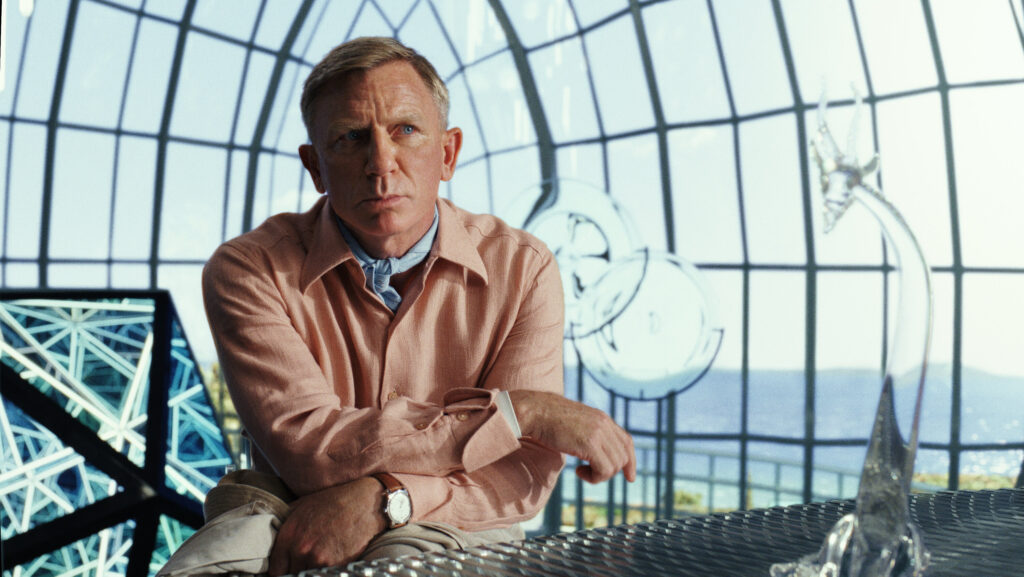
The real mystery of Glass Onion, Rian Johnson’s breezy and punchy sequel to Knives Out, is how Netflix so badly bungled its distribution. After bidding the GDP of a small country to secure its production rights, the streaming giant broke with its own foolish tradition and granted the movie a semi-wide theatrical release… for seven measly days. It made a healthy chunk of change during that span (over $13 million despite a general lack of marketing), but if you missed it, you’ll need to wait for its small-screen premiere later this month. This is frustrating, not least because Glass Onion is exactly the type of picture whose experience is vastly improved in a crowded theater—not because of its crisp visuals or its gleaming sets, but because of the murmurs of pleasure it inspires from its audience. That ineffable kinship—the ripples of laughter, the squirms of tension, the collective hum of anticipation and enjoyment—is unique to theaters. Netflix’s half-measure—offering a modest release but severely restricting its scope (not to mention its opportunities to make money)—is a puzzle so bizarre, even Benoit Blanc couldn’t solve it.
Blanc is back in Glass Onion, again played by Daniel Craig with a winning combination of Southern-fried decency and innate perspicacity. His return is the lone nominal carryover from Knives Out, though Johnson also retains the broader architectural blueprint of the whodunit. As a result, there is a bit less suspense this time around, and a bit more familiarity. You know the formula: A dead body will turn up, a cluster of suspicious malcontents will be implicated and suspected, and in the end Blanc will pierce the elaborately constructed veil and elucidate the plot’s relentless machinations. The build-up will be artificially loaded with crucial clues and red herrings, while the climax will be breathlessly satisfying and also beside the point.
Which is less a criticism than an axiom. Much deception unfurls over the course of Glass Onion—bald-faced lies and double-crosses, secret links and hidden schemes—but Johnson understands the genre’s fundamental truth: that the ultimate resolution of the crime is less important than the particular idiosyncrasies of its progression. The identity of the killer is irrelevant; what matters is the flavor, the color, the vibe. Glass Onion isn’t enjoyable because it’s a good murder mystery; it’s a good murder mystery because it’s enjoyable.
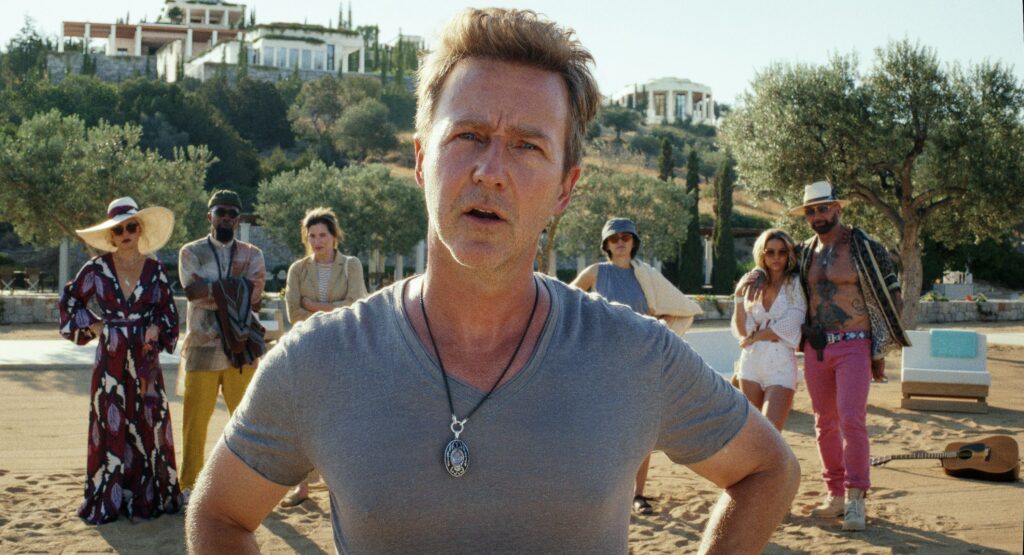
Perhaps this sense of pleasure is attributable to the movie’s cast, all of whom seem to be having a wonderful time. The plot of Glass Onion, which is subtitled in marketing materials (though not on screen) as “a Knives Out mystery,” involves an eccentric tech billionaire named Miles Bron (Edward Norton) inviting a handful of his closest friends (along with Blanc) to luxuriate with him on his private island. This means that Johnson himself has assembled a gifted crew—a blend of Oscar nominees, character actors, and lustrous celebrities—and drawn from them fine work as they bask in the Grecian sun. All of the performers are visibly relaxed, even if their characters inevitably prove to harbor feelings that are sinister and resentful—possibly even murderous.
But let’s not rush things, because Johnson certainly doesn’t. The brilliance of Knives Out was that it twisted the traditional whodunit into a pressure-cooked thriller, with Ana de Armas’ intelligent, guileless nurse constantly covering her tracks from the ever-encroaching Blanc while conducting some amateur sleuthing of her own. Johnson couldn’t possibly replicate this framework, so here he instead opts for patience. The tension inherent in most murder mysteries tends to dissipate with time; the easiest way to avoid that deflation is to delay the actual murder for as long as possible. It takes more than an hour before a corpse appears in Glass Onion, and Johnson spends the time establishing his opulent setting and defining his colorful characters.
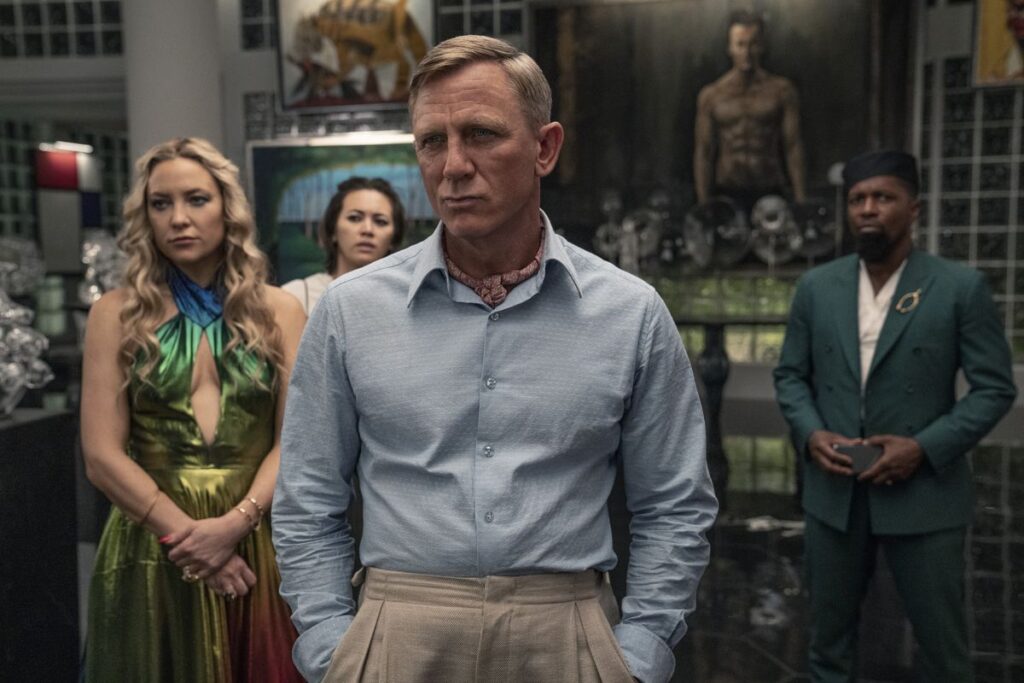
And they are a marvelously silly bunch. We first meet them during the movie’s expertly orchestrated cold open, a split-screen symphony set in the thick of COVID-19 in which various luminaries—a scientist, Lionel (Leslie Odom Jr.); a politician, Claire (Kathryn Hahn); a fashion entrepreneur, Birdie (Kate Hudson), and a Twitch celeb, Duke (Dave Bautista)—all receive what appears to be a solid wooden box. Confounded, these socially distanced friends gather via Zoom—Birdie dismisses concerns about isolation by explaining that the dozens of people partying behind her are all members of her pod—and gradually discover that the box is a nesting doll of codes and puzzles, requiring their collective resources and brainpower. (“It’s a Fibonacci sequence,” Jackie Hoffman drawls from the background at one point, prompting Duke’s exasperated shout of, “Mom!”) It’s an instantly engaging scene, staged with precise timing and visual wit, even as it also nudges the story forward; eventually, our foolish foursome all locate personalized invitations from the mighty Miles, who has used his vast wealth to propel their careers (thanks to nonsensical slogans like “Child = NFT”), and to whom they all remain in varying degrees of thrall.
Miles has gathered all of these high-strung associates, along with Blanc and a few others—Jessica Henwick plays Birdie’s beleaguered assistant, while a bikini-clad, heart-attack-inducing Madelyn Cline appears as Duke’s cagey girlfriend—for a murder-mystery party, in which he himself will play the faux victim. (In this, the film’s setup weirdly resembles Bodies Bodies Bodies.) As Blanc points out—though not before effortlessly solving Miles’ convoluted riddle (“I hired Gillian Flynn to write it!”) in hilariously cavalier fashion—this behavior is rather hubristic, given that all of Miles’ guests might actually want him dead. That would surely include Andi (Janelle Monáe), his former business partner whom he recently muscled out of his lucrative company, and who retrieves her own sheltered invitation by wielding brute force rather than intellectual cunning. While the other attendees are ostensibly friendly, using playfulness and civility to mask their fear and jealousy, Andi is more open in her hostility, and her icy chill threatens to ruin everyone else’s good time.
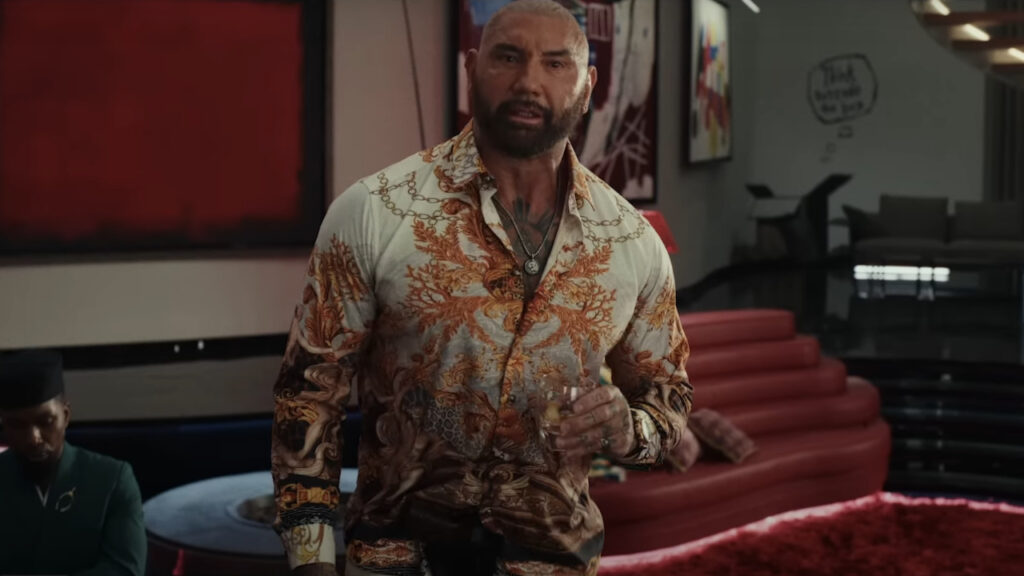
Initially, the same might be said of Monáe’s performance; where the rest of the cast is natural and charismatic, she’s tentative and stiff. Yet it turns out that her awkwardness is a feint, and a logical outgrowth of Johnson’s characteristically crafty screenplay. As befits its title (which derives from the flamboyant bulbous structure atop Miles’ palatial island mansion), Glass Onion systematically peels back its own layers, revealing new pieces of vital information—a missing gun, a clandestine cell phone, a MacGuffiny red envelope—with rhythmic regularity. Johnson isn’t interested in cheap twists but in narrative propulsion; he keeps bending his mystery in different directions, surprising you without cheating you.
He also pays as much attention to images as he does to words. This is a splendid-looking movie—it doesn’t hurt that the costumers outfit Hudson in a swirling multi-hued dress—with majestically ornate production design and the sonic detail to match. (The security protocols surrounding a prized painting end up playing a key role, and they’re accentuated with delightful whooshes and thwacks.) It also features giddy set pieces, as when the power suddenly goes out and the characters are plunged into darkness, illuminated only periodically by an oscillating lighthouse beam. And it may sound absurd, but the scene where a dollop of hot sauce trickles perilously toward a vulnerable orifice represents one of the year’s most agonizing moments of suspense.
There are times when Johnson’s cleverness verges on glib. He flaunts his clout by recruiting numerous celebrities for cameos (Serena Williams, Yo-Yo Ma), which is needlessly distracting. (Brief appearances from Ethan Hawke and Hugh Grant are more welcome.) True to form, he grants his friend Noah Segan a tertiary role, but the part never fulfills its comic potential. And as intricately constructed as the movie may be, its finale is oddly off pitch, with too much glass-smashing and flame-throwing.
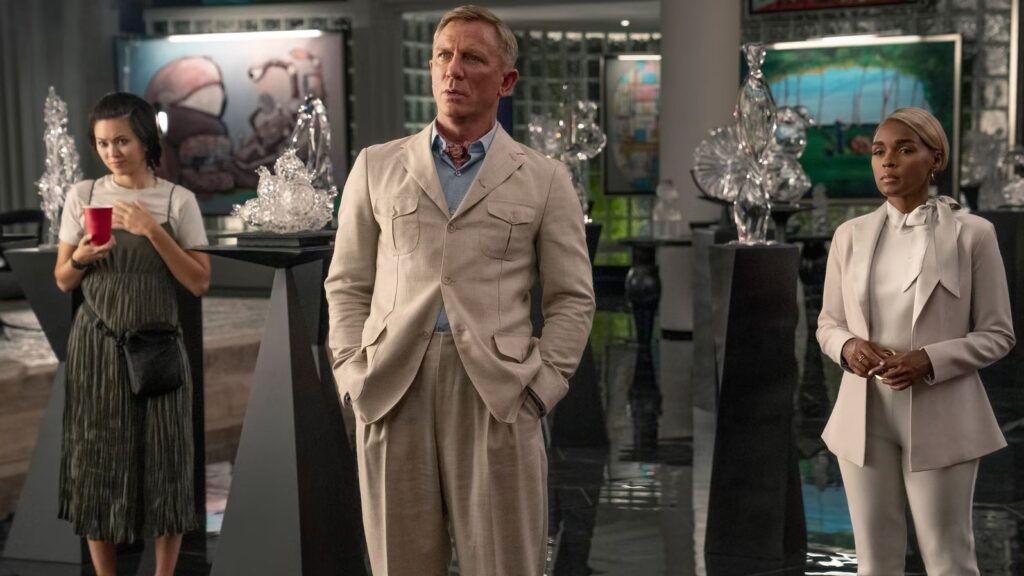
These are forgivable flaws, and Glass Onion is eminently enjoyable on its own terms, even absent thematic considerations. But just as Johnson smuggled some trenchant political commentary about immigration and old money into Knives Out, here he has delivered a surprisingly robust message about society’s bizarre worship of tech idols. Miles and his friends fancy themselves “disruptors”—free thinkers who upended an industry through their savvy instincts and revolutionary genius. Johnson himself is hardly a stodge, but he nonetheless puts the lie to this notion through a blistering mix of insight, anger, and humor. The meaty script is laden with funny morsels of dialogue, but no moment is more hysterical than Blanc’s disgusted eye-roll upon hearing someone misuse the word “circumspective.”
It’s possible to perceive Johnson as biting the hand that’s feeding him, given that Netflix CEO Ted Sarandos has repeatedly prattled about his company shaking up the very structure of cinema. But I prefer to think of Glass Onion as an attack on a different head honcho. At one point in the movie, Blanc declares that a certain figure whom everyone believes to be a mastermind is in fact an idiot. Watching that unimpeachably correct characterization—and having recently borne witness to the constant, inexplicable boondoggles which have plagued Twitter—I couldn’t help but stumble upon the answer to the mystery: that the real center of the glass onion, which Johnson has so grandly and brazenly exposed, is the monument to stupidity that is Elon Musk.
Grade: B+
Jeremy Beck is the editor-in-chief of MovieManifesto. He watches more movies and television than he probably should.
